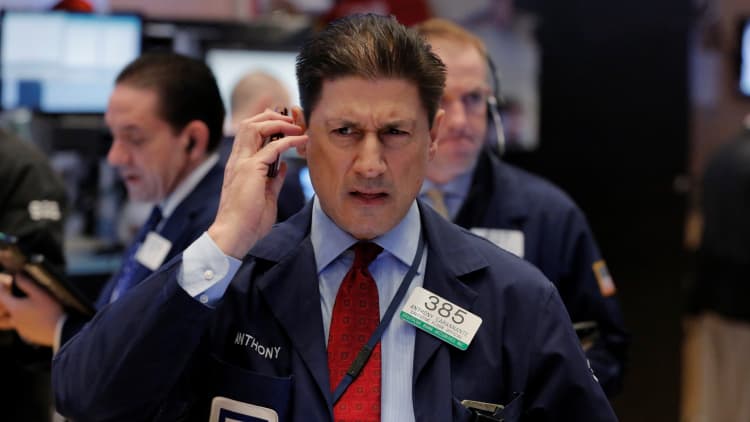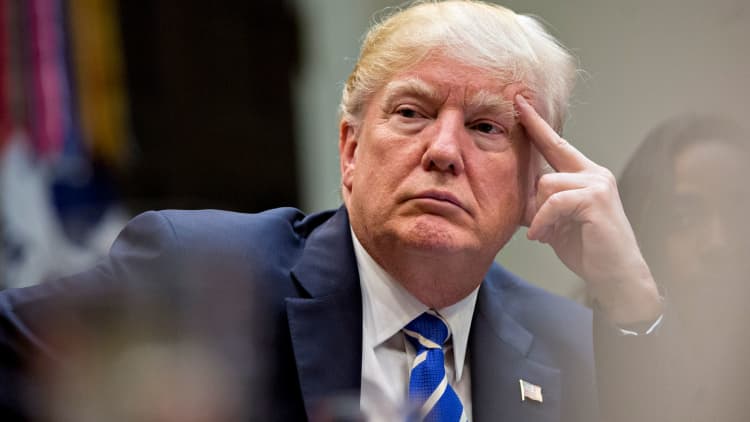
Congressional fumbling over health care could signal more volatility for stocks, but no correction is expected in the near future as long as President Donald Trump's pro-growth agenda remains largely intact.
Strategists say the market could see a decline of more than 5 percent, but it's not likely to drop the 10 percent, which would signal a full-blown "correction," as investors and Washington turn their focus to tax cuts. Since peaking earlier this month, the is now down about 2.6 percent. The benchmark index was down more nearly 1 percent Monday before significantly paring losses.
Stocks had largely been gliding higher since Election Day, with the S&P 500 up 10 percent amid the prospect of a faster-growing economy and tax policy that could give a kick to corporate earnings. However, the first big test of the president's ability to work with the Republican-led Congress didn't go well, and a bill to replace Obamacare failed last week without going to a vote.
"I believe you can argue that there were actually fundamental underpinnings to this move in the market. It wasn't just some euphoria or expectation of tax cuts. That's part of it. I can't tell you how much," said Bill Stone, chief investment strategist at PNC Wealth Management.
"I don't think [stocks] will give up the full 10 percent. ... I don't think this moves us back to correction territory. Are we overdue for a sell-off? Heck yeah, but I think you look at it as an opportunity to buy. It's not something to run away from," Stone said.
The House gave up on health-care legislation on Friday afternoon, once it looked impossible to win approval of a plan that would replace Obamacare. Killing the Affordable Care Act would have eliminated a slew of taxes, including a higher capital gains tax for the wealthy. Passage of the bill to replace it would have given House tax writers more flexibility.
"Where this sell-off goes is very dependent on how Washington reacts here. I think there's a good chance as we pivot to focus on tax reform, you get a bigger push from the administration and that could reverse this sell-off and push the market higher," said Dan Suzuki, Bank of America Merrill Lynch equity strategist.
The so-called Trump trade, which took off after the election, started to fizzle late last year and has been battered this year as stocks likely to benefit from his policies have been smacked around. Financial stocks, for instance, are still higher since Election Day, but year to date, they are flat. Many infrastructure plays, like Fluor, Manitowoc and United States Steel, are negative ins 2017. Small caps, with their "buy American" appeal, have also floundered. The Russell 2000 is down nearly 1 percent this year, while the S&P 500 is up more than 4 percent.

Stone said the risk now is that the market has higher expectations for a Trump tax plan than what might actually be put forth. The House plan includes the border adjustment tax, which would tax goods coming into the country at a rate of 20 percent. Supporters say the dollar would rise to offset that, but opponents say it is an unfair tax on retailers and other importers.
That bill faces challenges of its own, including Senate opposition to the border adjustment tax. Without that provision, Congress could not cut taxes by 20 percent and would risk opposition from conservatives since it would not be revenue neutral. The corporate tax rate is currently 35 percent, but the average rate paid by S&P 500 companies is 25 percent, so a tax cut of anything above 20 percent would not be much help to the biggest American companies.
"That's what the market is worried about," said Stone. "Does that put us into another stalemate? Eventually they could just throw in the towel and go for just tax cuts. That's a possibility. Some people believe you have to pay for the tax cuts. I think nobody has the concrete answer. That's why the market is struggling. …You have a setback like this and all of a sudden people start worrying." Stone said it's not clear how much tax reform has been calculated into this year's earnings expectations so there may also be volatility as expectations are adjusted.
Based on the wrangling around health care, Suzuki said it's likely the road to tax reform will also be rocky. "There's going to be some big open, public fights. That's going to bring volatility to the market after that push up," said Suzuki, noting the pop stocks could see if Trump makes a big push on corporate taxes.
He said the market could also have some hiccups as first quarter data should show a spotty economy. "That has the potential to introduce more volatility in the market this year. People who feel like they missed out on the postelection rally are going to get a chance to buy back in at similar levels," he said.
Suzuki said there are other concerns, including Brexit, French elections and the OPEC meeting in May.
But the market will also enter an earnings period that could have mixed impact. "We think the first quarter will mark the peak in year-over-year earnings growth," he said, adding he expects 9 to 10 percent earnings growth.
WATCH: Here's what the House GOP proposed tax plan means for Americans



